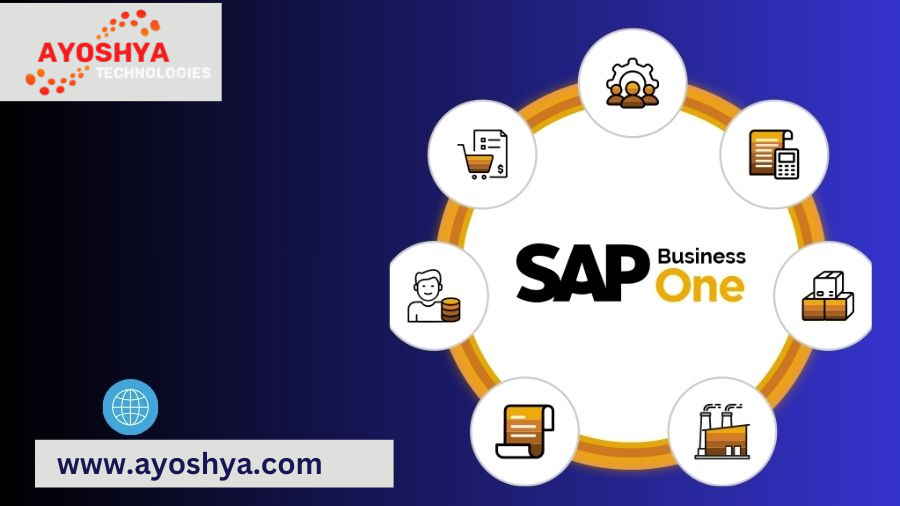Boost Your Business with the Right SAP Business One Partner
Navigating the world of SAP Business One partners can be overwhelming. This guide demystifies the process, helping you choose the perfect partner for your unique needs. Explore selection criteria, benefits, costs, and common questions… Find the ideal partner to optimize your SAP Business One journey and empower your business growth!
Feeling the SMB struggles? Drowning in data, yearning for efficiency, and dreaming of growth? You’re not alone. Many small and medium businesses (SMBs) wrestle with complex enterprise resource planning (ERP) systems, leaving them frustrated, bogged down, and stuck in neutral. But fear not, weary entrepreneur! The answer lies not in ditching your ERP system, but in in empowering it with the right SAP Business One partner. Think of them as your ERP superheroes, swooping in to rescue you from implementation woes, support nightmares, and the dreaded customization conundrum. This comprehensive guide equips you with the knowledge and tools to choose the perfect SAP Business One partner, transforming your ERP system from a burden into a business-boosting rocket ship. Discover key selection criteria, unlock the hidden benefits of partnering, and conquer common questions – all to navigate the exciting world of SAP Business One partners with confidence. Get ready to say goodbye to the SMB struggles and hello to smooth implementations, ongoing support, and explosive growth – powered by the perfect partnership!
Finding Your ERP Soulmate: Choosing the Right SAP Business One Partner
Imagine navigating a complex mountain trail without a seasoned guide. The journey could be treacherous, frustrating, and ultimately lead you astray. Selecting the right SAP Business One partner is similar – choosing the wrong one can derail your ERP implementation and hinder your business growth. But fear not, intrepid entrepreneur! This section equips you with the essential criteria to discern your ERP soulmate, ensuring a smooth and successful journey to the business summit.
1. Industry Expertise: Speaking the Same Language:
Imagine consulting a doctor specializing in sports medicine when you have a heart issue. It wouldn’t be ideal, right? Similarly, choose a partner with in-depth knowledge of your specific industry. They understand your unique challenges, speak your business language, and can tailor solutions that perfectly align with your needs.
For example, if you run a restaurant, consider a partner experienced in implementing SAP Business One for hospitality businesses. They’ll understand the nuances of menu costing, table management, and loyalty programs, ensuring your system supports your specific operations seamlessly.
2. Implementation Experience: A Proven Track Record of Success:
Imagine entrusting your car’s engine overhaul to a novice mechanic. It’s a recipe for disaster! Your SAP Business One partner should boast a proven track record of successful implementations. Look for certifications, references, and case studies showcasing their expertise in delivering projects on time, within budget, and exceeding expectations.
Don’t hesitate to ask potential partners about their experience with businesses similar to yours in terms of size, industry, and complexity. Their past successes are the best indicators of their ability to guide you towards your own ERP nirvana.
3. Support Capabilities: Your Ever-Present Guide:
Imagine conquering the mountain peak only to find yourself stranded with no way down. It’s crucial to choose a partner who offers robust and responsive ongoing support. This includes technical assistance, user training, system updates, and regular consultations to ensure you maximize the value of your ERP throughout its lifecycle.
Ask potential partners about their support models, response times, and escalation procedures. Consider options like 24/7 support, on-site assistance, and remote access solutions to guarantee you’re never left facing ERP challenges alone. what does crm stand for, crm stands for, sap vs oracle, erp in financial management, crm meaning in business,sap business one partner, operational data store
Unveiling the Hidden Benefits of Partnering with an SAP Business One Partner
Imagine climbing a mountain just to admire the view, then leaving the hidden treasures buried beneath the surface. Partnering with an SAP Business One partner goes beyond a successful implementation – it unlocks a treasure trove of ongoing benefits that propel your business to new heights. Let’s explore these hidden gems and discover how the right partner can become your secret weapon for growth:
1. Faster and Smoother Implementation: Shortcut to Success:
Think of navigating a complex maze without a map. It’s time-consuming, frustrating, and prone to wrong turns. An SAP Business One partner acts as your expert guide, leveraging their implementation experience and industry knowledge to streamline the process. They handle complex configurations, data migration, and user training, ensuring a smooth and efficient launch, saving you valuable time and resources.
Imagine launching your new ERP system weeks (or even months) earlier, without the stress and hassle. This expedited implementation translates to faster ROI, allowing you to reap the benefits of your ERP solution sooner and gain a competitive edge in your market.
2. Reduced Risks and Minimized Downtime: Peace of Mind on the Climb:
Imagine scaling a treacherous cliff face without proper safety equipment. It’s risky and potentially disastrous. Your SAP Business One partner acts as your safety net, mitigating risks and minimizing downtime throughout the implementation and beyond. They anticipate potential challenges, proactively address issues, and have established best practices to ensure your system runs smoothly and efficiently.
Think about the cost implications of system downtime for your business. A reliable partner minimizes these disruptions, protecting your revenue and ensuring your operations continue uninterrupted. This peace of mind allows you to focus on what matters most – growing your business with confidence.
3. Customized Solutions: A Tailor-Made Fit for Your Business:
Imagine wearing ill-fitting clothes while scaling a mountain. It’s uncomfortable, restrictive, and hinders your performance. Generic ERP implementations can feel the same – unsuited to your specific needs and hindering your growth potential. An SAP Business One partner acts as your tailor, crafting customized solutions that perfectly fit your unique business processes and industry requirements.
They understand your workflows, challenges, and goals, and configure your ERP system to address them effectively. Imagine automated processes, streamlined operations, and data-driven insights – all tailored to your specific needs. This customization empowers you to achieve operational excellence and gain a competitive advantage in your market.
Common Questions about SAP Business One Partners
Choosing the right SAP Business One partner can feel like navigating a foreign land. Don’t worry, intrepid explorer! This section tackles frequently asked questions, serving as your trusty map to guide you through the decision-making process with clarity and confidence.
1. How much does an SAP Business One partner cost?
This depends on several factors, including the scope of your project, partner expertise, and chosen engagement model. Generally, partners offer various options:
- Fixed-cost projects: Ideal for smaller implementations with well-defined scope.
- Time-based billing: Suitable for more complex projects or ongoing support.
- Value-based pricing: Focused on delivering specific business outcomes.
Remember, the cheapest option isn’t always the best. Consider the value a partner brings beyond just implementation, such as industry expertise, customization capabilities, and ongoing support, when evaluating cost.
2. What are the different types of SAP Business One partners?
The SAP PartnerEdge program categorizes partners based on their specialization and expertise. Here are some key types:
- Value Added Resellers (VARs): Sell, implement, and support SAP Business One solutions.
- Certified Implementation Partners: Possess deep technical expertise and proven implementation success.
- Industry-Specific Partners: Specialize in tailoring solutions for specific industries.
Research each type and their areas of focus to find a partner that aligns with your specific needs and industry.
3. What questions should I ask potential partners?
Prepare a list of questions to assess their capabilities and suitability. Key areas to explore include:
- Industry experience and relevant case studies.
- Project methodology and communication approach.
- Support options and response times.
- Pricing structure and cost transparency.
- References and client testimonials.
Don’t hesitate to ask detailed questions and request clarifications. Remember, the more informed your decision, the more successful your partnership.
4. How do I ensure a successful partnership?
Open communication, clear expectations, and active collaboration are key. Here are some tips:
- Clearly define project goals and success metrics.
- Maintain regular communication and address concerns promptly.
- Provide timely feedback and actively participate in the process.
- Leverage the partner’s expertise and best practices.
- Build a strong working relationship based on trust and mutual respect.
By following these tips and addressing common questions head-on, you’ll be well-equipped to choose the right SAP Business One partner and embark on a successful journey towards realizing your business goals. Remember, the perfect partner is out there, waiting to guide you to the summit of ERP success!
Conclusion
Scaling the Peak: Your Partnership Journey to ERP Success Begins Now
From navigating treacherous implementation paths to unlocking hidden treasures of customization and ongoing support, the right SAP Business One partner becomes your trusted guide on your climb towards ERP success. Remember, choosing wisely isn’t just about reaching the summit – it’s about enjoying the journey with confidence, efficiency, and a newfound competitive edge.
This comprehensive guide equipped you with the essential criteria to find your perfect partner – industry expertise for a smooth ascent, implementation experience for a safe journey, and support capabilities for peace of mind along the way. You explored the hidden benefits of partnering, from faster implementation and reduced risks to customized solutions and data-driven insights – all tailored to propel your business growth. Finally, we demystified common questions, empowering you to ask the right questions, understand different partner types, and ensure a successful, collaborative partnership.
Now, it’s time for action! Don’t let this valuable knowledge gather dust. Start researching potential partners, leveraging the resources and tools mentioned throughout this guide. Remember, choosing the right partner is an investment in your future. By prioritizing the key criteria, asking informed questions, and building a strong relationship, you’ll secure your ERP soulmate – and unlock the hidden potential within your business, propelling you towards the peak of success. So, embark on your partnership journey today – the breathtaking views from the summit await!
you maybe interested in this blogs:-







